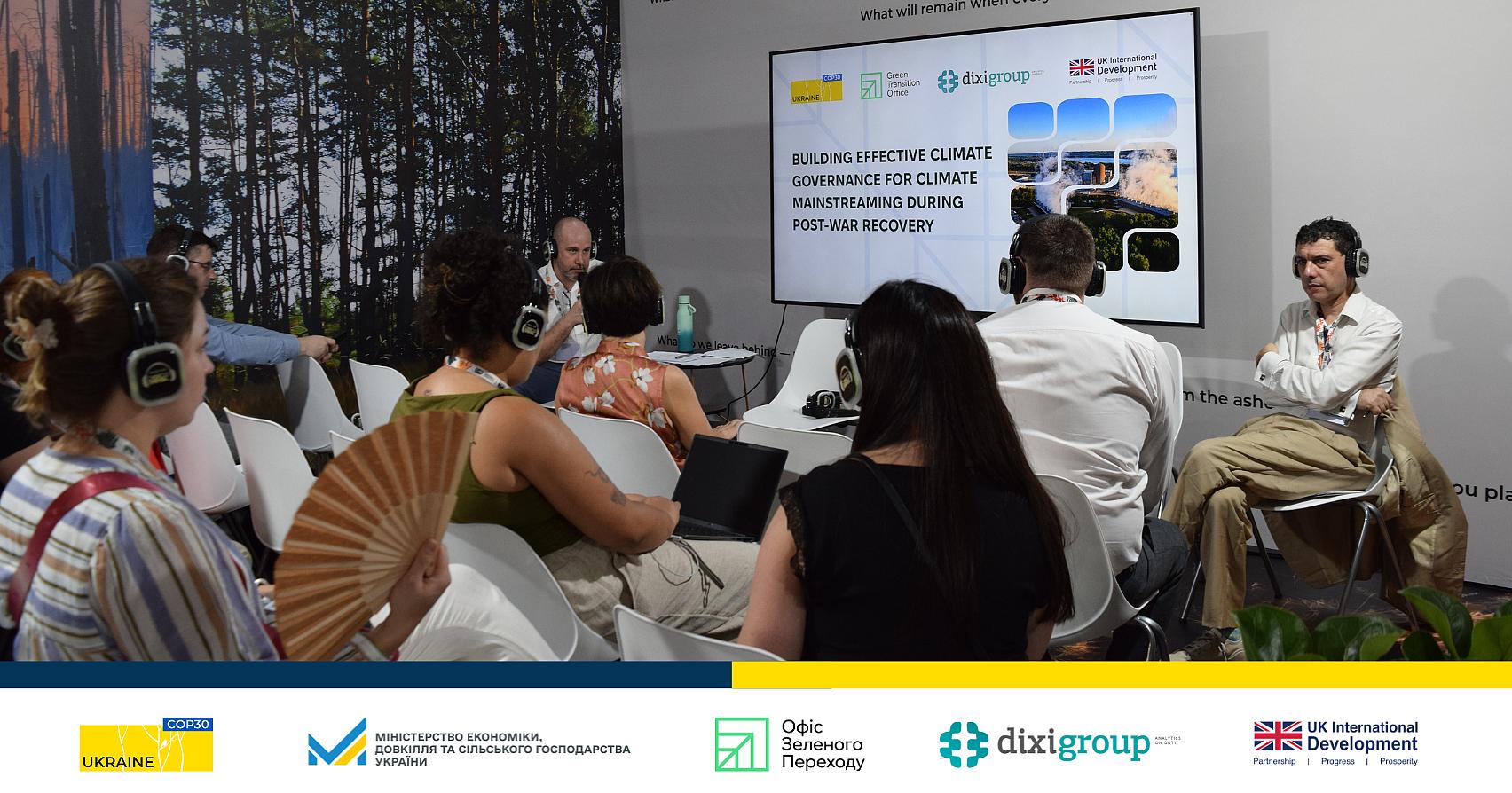Building Effective Climate Governance: Experts Discuss Ukraine's Future at COP30
The Green Transition Office team, together with the Ministry of Economy, Environment and Agriculture of Ukraine, organized a panel discussion "Building Effective Climate Governance to Integrate Climate Considerations into Post-War Recovery" as part of the UN Framework Convention on Climate Change Conference of the Parties – COP30. The event took place on November 12, 2025, at the Ukraine Pavilion in Belém, bringing together Ukrainian government officials, representatives from the European Commission, the United Kingdom, and international organizations.
Ben Rhodes, Head of the Secretariat of the International Climate Councils Network (ICCN), served as the discussion moderator. Opening the event, he emphasized that effective governance is the key to making the right policy choices, engaging stakeholders, and creating a stable investment environment.
Deputy Minister of Economy, Environment and Agriculture of Ukraine Pavlo Kartashov spoke about the unique feature of the new Ukrainian government structure. According to him, this marks the first time in history that a ministry combines economy and environment, which doesn't signal a reduced priority for climate issues – quite the opposite. It demonstrates the commitment to making the economy green and ensuring goals are aligned. Sustainable development must become a cross-cutting element of Ukraine's future development, the speaker emphasized.
He outlined the strategic foundation Ukraine has already built: a framework climate law has been adopted, a climate neutrality target by 2050 has been set, and a new NDC with an emission reduction target of over 65% by 2035 has been approved. Among the steps to strengthen institutional capacity, the Deputy Minister highlighted the creation of a new advisory body:
"By the end of this year, we plan to approve the regulations and composition of the new Scientific and Expert Council on Climate Change and Ozone Layer Protection. This will be analogous to climate councils that exist in other countries. We are exploring the possibility of engaging the Green Transition Office under the Ministry's umbrella to serve as the secretariat, providing operational functionality on a day-to-day basis – the legal framework is currently under review."
Diana Acconcia, Director for International Affairs and Climate Finance at the European Commission's Directorate-General for Climate Action, outlined the role of the NECP in Ukraine's European integration. She explained that the NECP is the operational backbone of energy and climate governance, serving as a tool for alignment with the EU and a system for performance assessment. The European Commission representative noted that Ukraine needs to update its NECP by the end of 2025 and continue raising its ambitions in line with EU commitments.
Member of the UK Parliament and Trade Envoy to Ukraine Alex Sobel emphasized the prospects for bilateral cooperation. He stressed that through strategic partnerships, climate-aligned trade, and joint innovation, the two countries can together build a greener, more resilient, and economically dynamic future.
Director of the Energy Community Secretariat Artur Lorkowski drew attention to the practical benefits of Ukraine's international commitments. He emphasized that the Energy Community provides a fast track to EU-compatible regulations – implementing reforms today lays the foundation for large-scale recovery tomorrow. Director Lorkowski stressed the importance of a coherent framework: strategy, plan, and execution.
Director of Development at DiXi Group and Head of the Green Transition Office Andriy Kitura shared insights on the institutional challenges in implementing climate policy and the NECP, as well as pathways to overcome them. He candidly acknowledged that Ukraine is still shaping a clear vision of how to reconcile economic growth with emission reductions – a challenge that remains relevant for many countries worldwide.
The Office team is developing concrete solutions, including a draft Cabinet of Ministers resolution on climate policy monitoring based on tracking NECP implementation. When asked what support is needed from international partners, the Head of the Office was clear and specific:
"I believe the greatest support is needed for implementing specific policies. We need to establish an emissions trading system, implement RED III, meet the conditions for market coupling in the energy sector, and tackle many other complex regulations. What's required is systematic, long-term work by the government with partners – not short-term ad hoc activities."
The discussion confirmed that effective climate governance demands systematic work on institutional capacity, transparency, and international cooperation. Despite the challenges of war, Ukraine continues to build the foundation for the country's green recovery.
The Green Transition Office is an independent advisory body under the Ministry of Economy, Environment and Agriculture of Ukraine that helps to implement reforms in the field of green transition, energy and climate policy of Ukraine. The Green Transition Office operates with the financial support of the UK Agency for International Development and is implemented by DiXi Group.
Published on
